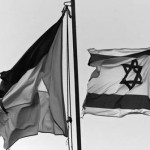Wednesday
Aug252010
Israel-Palestine Analysis: What is Washington's Strategy on Settlements and Talks?
 Wednesday, August 25, 2010 at 11:41
Wednesday, August 25, 2010 at 11:41  On Monday, reminded about the statement by Palestinian representatives that they would walk away if the settlement freeze was not extended in the West Bank, U.S. State Department Spokesman P. J. Crowley said:
On Monday, reminded about the statement by Palestinian representatives that they would walk away if the settlement freeze was not extended in the West Bank, U.S. State Department Spokesman P. J. Crowley said:Well, first of all, we look forward to the first meeting next week with Prime Minister Netanyahu, President Abbas, and Secretary Clinton here on September 2nd as well as the individual meetings and dinner that President Obama will host at the White House on September 1st. We look forward to getting into the direct negotiation and then we believe that once that negotiation starts, it’ll be incumbent upon both the Israelis and Palestinians to avoid steps that can complicate that negotiation.
Middle East Inside Line: Hezbollah’s “Evidence” on Hariri Assassination; A Nuclear Reactor in Lebanon?
Palestine-Israel Analysis: Ramallah’s “One Month Trial” and Netanyahu’s “Security Card”
Then, asked whether Washington was worried that the Israelis had not committed to extend that moratorium, Crowley implicitly revealed the Obama Administration's expectations:
No. As we’ve been saying throughout this process, our focus has been to get the parties into direct negotiations and once in the direct negotiations, then these very issues will be tabled and resolved.
On Tuesday, Crowley was asked whether the US had reached an understanding with Israelis that there would be no announcement that the settlement freeze would continue but some construction, possibly in large settlement blocks, would continue. Crowley did not deny but reiterated Washington's classic statement: "Well, we look forward to the meetings next week."
In contrast, a senior administration official briefing reporters in Jerusalem said that the US position had not changed,and that Washington “doesn’t accept the legitimacy of continued Israeli settlements”. The official also said there were no “clandestine” understandings with either side.
On Wednesday, two US officials --- Daniel Shapiro, a top National Security Council staffer handling Israel and neighbouring countries, and David Hale, deputy to special Mideast envoy George Mitchell --- are going to the region to talk separatelywith Palestinians and Israelis.
Washington's message is clear to both sides: No provocative actions until 2 September and the start of the directly. The second strategy is to urge the Israeli government for a partial, if not a full, settlement freeze in the West Bank. Still, the question remains: beyond the refugee and status of East Jerusalem issues, how is the US going to persuade Ramallah to accept a peace plan likely to be linked to Israel's "sensitive" security concerns, even if it is based on 1967-War borders(even not mentioning the refugee and the status of East Jerusalem problems)?




